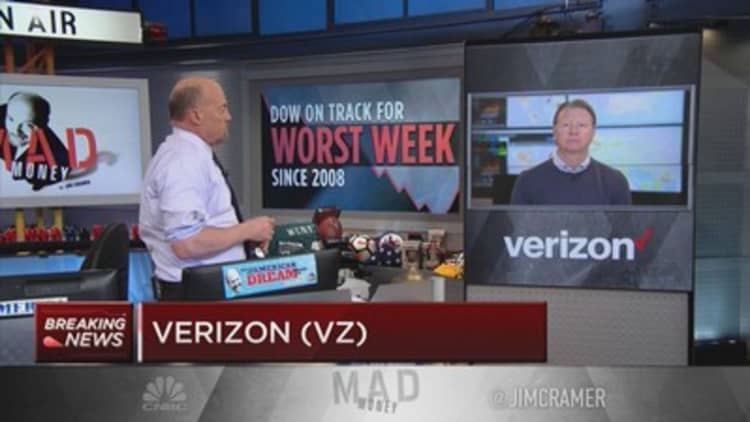With schools and day cares closed down nationwide due to Covid-19 shelter-in-place orders, many parents have been struggling since mid-March to work from home with kids underfoot, leading many to rely on video games and other devices to keep children occupied.
Media and digital devices are an integral part of our world today, and the benefits of these devices, if used moderately and appropriately, can be great, says the American Academy of Pediatrics. But research has shown that face-to-face time with family and friends is important in promoting a child's healthy development. And so is getting outdoors.
Unfortunately, the pandemic has kept most families locked in and on their devices.
Thirty-year-old Indiana native Andrew Armour is hoping to change that. Through an app he created, called Activate Fitness, a child earns screen time only if specific activity levels are met. For example, 1,000 steps could earn the device user 5 minutes of screen time.
Activate Fitness installs on both parents' and children's devices, enabling parents to set activity goals — like performing sets of jumping jacks or walking flights of stairs — that must be reached before a child's gaming apps are unlocked. Daily activity levels are generated through the use of Apple Health, Google Fit or a wearable fitness tracker such as a Fitbit. The app is free and is available in both the Apple and Android app stores.
No more nagging
The best part, says Armour, is no more nagging from parents. Once the app is activated and the parents set the activity goals, it's up to the children to earn the screen time. If your children want access to their favorite games and social media applications, then they are going to have to work for them, he says.
"Parents can be more productive, and they don't have to monitor their kids all day," says Armour, who graduated with a business degree in 2012 from the University of Indianapolis, where he played both basketball and baseball. "Screen time is in the hands of the child. All the kid has to do is be active, reaching another physical activity goal."
The idea came to Armour, an IT consultant and high school baseball coach, back in 2016 when he recognized a pattern of dependency on devices among his niece, nephew and the kids he coaches: None of them could get off their tablets or phones, he said. He started worrying over the harmful effects this could cause to a child's physical health and overall well-being.
"I go out to dinner and see kids always on their devices," said Armour. "I was always outside growing up. One day I was at my oldest brother's house and my niece and nephew were behind the couch on their devices. It was a beautiful day. I live in Indiana, and there is only a handful of days like that. I couldn't get them outside."
So four years ago he set to work creating his app, working with Smash Cloud Media, a software development company located in Pakistan. In 2019 he received the patent for his technology. His is the only screen-time software that regulates usage based on physical activity.
"I'm the only one that offers physical activity integration. Kids who use competitors' [screen time] apps either turn to TV or annoy their parents. Their systems do not automatically reward the consumer."
Nevertheless, despite being free in the app store — current screen-time management apps charge families a subscription fee of anywhere from $2.99–$9.99 per month — Activate Fitness has generated only 500 or so downloads, likely because it is more difficult for independent screen-time app developers to get noticed.
Armour says he is losing $300–$500 monthly just to keep Activate Fitness up and running — he has invested $70,000 of his own money into the app over the past four years — and is hoping to catch the attention of investors. Specifically, Alphabet's Google, which owns Fitbit.
"This could drastically improve Fitbit's business," Armour claimed, noting that his patented software allows consumers to restrict their childrens' screen-time usage right from their Fitbits. Furthermore, he says, Google's Family link, which is another screen-time application that monitors screen time for children, does not have the physical fitness element to it — another reason Armour believes it would be an even greater integration for the tech conglomerate.
The Covid-19 gaming spike
Armour's fears over the rise in gaming are warranted, especially as the pandemic continues to keep children at home. Amazon's gaming platform,Twitch, has seen an increase of more than 20% since the coronavirus pandemic began, and in March, Verizon CEO Hans Vestberg told CNBC's "Mad Money" host Jim Cramer that the company's web traffic jumped 20% and gaming skyrocketed 75% after just one week of being in lockdown.
Part of the problem is that media giants are providing loads of free content to consumers, encouraging them to stay inside and practice social distancing. Time Warner's HBO, for example, is offering free streams of popular children's movies, including "Happy Feet Two," "The Lego Movie 2: The Second Part" and "Nancy Drew and The Hidden Staircase."
And sports have completely redesigned to an esports model.

Prime-time networks that usually thrive off of airing sporting events, like Disney's ESPN, have turned to esport competitions, with coveted athletes like NBA All-Star Kevin Durant headlining, to fill empty airtime slots. Fox Sports has aired Madden football tournaments, featuring the likes of Michael Vick, DeAndre Hopkins and other NFL players. And Major League Baseball's official television network recently aired an "MLB The Show" tournament — a popular baseball game for the PlayStation 4 — with a catalog of MLB all stars participating.
'Crayons, potted plants and seeds to grow'
Dr. Karen Sobel Lojeski says video game tournaments like these "couldn't be sending a worse message to children." An expert on the detrimental effects of too much screen time, she says that "with all that Kevin Durant [and other athletes] could be doing, with all the kids who look up to him and his work ethic, to make it seem like sitting in a chair and pushing on a glass screen [or buttons on a controller] is something that kids should admire is hypocritical and poisonous."
She compares children who use apps like Activate Fitness to dogs and mice in a lab, contending that rewarding children with more screen time later on is sending the wrong message. She says apps like Activate Fitness teach kids to respond to a computer program rather than to an actual human being.
"It's a problem because our whole internal system — instead of it being based on joy or fun or because we are human beings — it's based on a motive for reward," Sobel Lojeski said.
"What children should have are crayons, potted plants and seeds to grow, because that is naturally what will make them healthy adults," she said.
Nonetheless, Sobel Lojeski acknowledges that the world is in rare form because of the pandemic and that parents need help to stay focused and productive at work — even if it means being rewarded with an hour on the Ipad for doing 50 jumping jacks.




